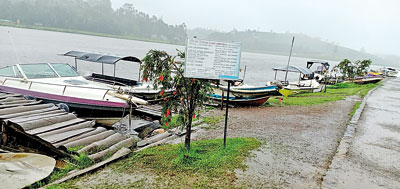News
Crisis causes tourism blip just as Lanka image is boosted
The political crisis has prompted 10-15 per cent of hotel bookings to be cancelled in some areas but the Sri Lanka Tourism Promotion Bureau insists the impact is minimal, with hundreds flying in over the past week.

There was a drop in tourist numbers in Nuwara Eliya as seen in these pictures taken yesterday
“As of last week, four charter flights arrived in Sri Lanka carrying about 900 passengers from Poland, UK, Switzerland and Russia, and the ongoing cricket match against England has also attracted the Barmy Army to the island. All of them will have a positive impact on the tourism industry,” The bureau’s Director of Public Relations, Dushan Wickramasuriya said.
Most of the travel advisories simply requested tourists to be cautious about the political situation and were not bans. Mr. Wickramasuriya said Tourism Minister Wasantha Senanayake, lobbied for the travel advisories to be lifted while visiting the World Travel Mart (WTM) in London from November 5-7.
Sri Lanka launched a new destination brand identity, “So Sri Lanka”, at the WTM, a major global travel industry event that attracts many thousands of travel agents, visitors and travel journalists.
Mr. Wickramasuriya said a group of eight location managers from UK are expected to visit Sri Lanka to promote Sri Lanka as a film destination, and added: “We are hoping that these events will lead to a positive outcome”.
The Sunday Times found that tourists currently in the country are generally at ease about the political situation and enjoying their holiday.
Teresa Feldoff, from Germany, said she had not experienced anything adverse. “Embassies can post things in a dramatic way during such times and mostly it is the elderly people who seek advice from embassies before travelling,” she said.
Florence Mitchell, a UK national, read the British government travel caution a week after booking her tickets but decided to come here nevertheless.
“I read that it’s a more Colombo-based situation and definitely something to keep an eye on if it blows out of proportion,” she said.
Ms Mitchell said street protests were normal in UK and not something to be alarmed about, and because she had not seen anything worrying so far she wanted to travel to other parts of the country.
Eloise Sutton, from Canada, said the advisories stated the situation was Colombo-based and that nothing was going to spread to other parts anytime soon.
“A lot of Sri Lankan people asked us how our stay has been so far. We could sense the hostility people have towards politics in the country – we find such hostility quite normal even back at home,” Ms Sutton said.
Dr. Chandra, from India, had booked before the political chaos erupted. “We were definitely concerned about what was happening and consulted our travel agency but were told the situation had not gone out of control,” he said.
Sabine, from Germany, had been planning to travel to Nicaragua but found that was too dangerous so had changed her mind and decided to come to Sri Lanka. “My husband and I didn’t look up the travel advisories. We heard this is a beautiful country and thought we should pay a visit,” she said.
Despite the upbeat comments a local tour guide observed that while normally there was a mix of tourists from around the world, “there were only a lot of Indians and Chinese travelling around the country during the past couple of weeks” and the numbers were down.
T.K.R. Chandana, who manages a touring company, Sri Lankan Trip Advisor, found a number of bookings had been cancelled due to the political crisis.
“There were many inquiries by concerned tourists about the prevailing situation and I had to send them recommendations from my other guests in order to reassure them,” he said.
Mr. Chandana usually gets about 10-15 tours in November and December and usually receives 10-15 email inquiries a month. So far this month, he had only received six emails.
Hoteliers said there had been booking cancellations. The President of the Cultural Triangle Hoteliers Association, Saliya Dayananda, said 10-15 per cent of hotel bookings in the region had been cancelled, mostly group tours from Scandinavian and European countries.
“The country must have political stability. When there’s unstability nobody wants to come to the country,” he said, predicting more cancellations if the crisis in government continued.
“Travel advisories have definitely affected the tourism industry including most of the hotels,” he said.
President of the Galle and Hambantota region hotels Shamindra Fernando said a number of online bookings had been cancelled in the past couple of days.
“It was just a couple of weeks ago when Lonely Planet ranked our country as the number one destination to travel to, and then this happens,” he said. “The travel advisories have had an impact on the tourism industry because there have been a lot of queries made by concerned tourists.”

